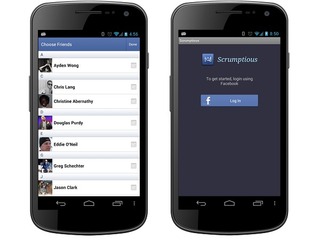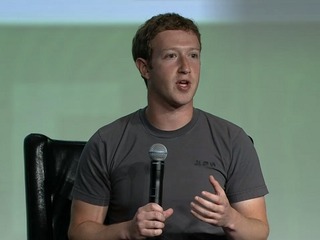The FDA outlines draft guidance on AI for medical devices
The agency also published draft guidance on the use of AI in drug development
Read more...
In September, Mark Zuckergberg gave his first interview since Facebook’s IPO. He talked about a lot of different topics, from Facebook’s mobile strategy, to his biggest mistake. There was one thing he spoke about, though, that I was sure would gain more interest and traction.
When asked if Facebook ever thinks about search, Zuckerberg gave this reply:
"You know, search is interesting. We do on the order of a billion queries a day already and we’re basically not even trying. So today, search is, the vast majority of it, is people trying to find people but there are also a meaningful portion of queries of people trying to find pages, brand pages, businesses pages and apps. So there’s a bunch of it actually does link to commercial behavior, and I think that there’s a big opportunity there, at some point, and we just need to go do that.”
He also said that there was a team working on search and called it, “One kind of obvious thing for us to do in the future if we got to state where we were excited about it.”
Based on those answers, it's fair to say that we will one day get a Facebook search engine. But is it a good idea? Let’s take both views.
A Facebook search engine is a good idea!
Last week a survey from Sterne Agee asked 750 Facebook users how they felt about the company’s mobile platform and its new features, including gifts and promoted posts. One thing the survey also asked, though, was about a potential Facebook search engine. And the results point toward a positive for the social network
Nearly half, 47%, of the respondents in the survey said that they would consider using a Facebook search engine.

While only 1.3% said they would be highly likely to use it, and 4.4% said very likely, 14.4% answered that they were moderately likely and 27.3% said slightly likely. 52.6% said that they were not at all likely to use a Facebook search engine.
Still, given that Facebook has 900 million users, if only half of them used it, that would be 450 million people. According to the latest ComScore study, that would already put it in the top five search engines, above AOL, and right below Ask Network, and that is if each of those people only performed one search a month.

Needless to say, that puts Facebook in a pretty good position right from the start, so if there is going to be a problem it would be about how many people are using it, but who is using the search engine.
In an interview with VatorNews, Arvind Bhatia, senior research analyst at Sterne Agee, said that when the numbers from its survey were broken down by age, it was, to his surprise, the older people surveyed who were more willing to use a Facebook search engine. Only 34% of the 18-29 year olds said they would try it.
Bhatia says this may be because younger people have grown up using Google, and may be less likely to switch.
Still, he said, 47% is a very large number, and he reiterated what Zuckerberg said in his interview: Facebook reached that number without even doing anything.
According to Bhatia, what Facebook must do to make its search engine successful is differentiate itself from Google.
"There is no point in going head to head with Google," he said, "especially given how much Facebook knows about people."
What Facebook should do is combine traditional search with social media. It should mine the data they have collected on its users, and use that to perhaps give two kinds of data the same time: traditional search results, as well as results based on their social network.
Zuckerberg actually said something very similar to this during his interview, where he said that search is evolving from trying to predict what might be revelant, to answering specific questions.
"I think that search engines are really evolving toward a giving you a set of answers. It’s not just like, ‘type in something, show me some relevant stuff,’ its, ‘I have a specific question, answer this question for me.’ And when you think about it from that perspective, Facebook is pretty uniquely positioned to answer a lot of the questions that people have."
For example, he said, you can see what sushi restaurants your friends have gone to in New York, in the past six months and liked. Or you can find friends, or friends of friends who work at a company that a person is interested in working at, so they can contact them to find out more.
"These are queries that you could potentially do at Facebook is we built out the system that you just couldn’t do anywhere else," Zuckerberg said.
A Facebook search engine is a bad idea!
So there is interest in a Facebook search engine, and Facebook has unique data to mine. So what could be the problem?
Think about any time a company has taken its core functionality and tried to do something completely different with it? It usually doesn't work.
That was the point made to me when I spoke to Kevin Stephens, the co-founder and CEO of social discovery app Kismet. Prior to Kismet, Kevin worked at Google and was one of the earliest members of the mobile team and a key member of the AdSense team, where he worked across Engineering, Product, and Business Development to help build Google's mobile presence in Asia Pacific and Latin America.
Facebook trying to get into search, he said, "is like trying to reinvent the wheel."
Think about how hard it is just to find people you may know on Facebook, he said. If you know someone named Kevin Brown, for example, how many people do you have to scroll through just the find the right Kevin Brown? Facebook needs to shore up its current search capabilities first, he said, before it can even think about creating its own search engine.
Stephens compared Facebook getting into search with Google setting into social media with Google+:"It feels like an afterthought."
And when looking at the numbers from that angle, they do not seem promising.
Google+ was launched in June 2011 and according to a blog post by Google+ product boss Vic Gundotra last month, the site had 400 million users. While that sounds impressive, it only has 100 million monthly active users. Facebook recently announced that it passed one billion MAUs.
Maybe it is unfair to compare the two, since Facebook has been around so much longer than Google+, but Facebook has such a wide lead at this point that Google+ will likely never catch up. And the same might be true for a Facebook search engine trying to catch up to Google
Of course, this is all speculation at this point. We tried to get in touch with Facebook to see what concrete plans, if any, the social network has for getting into search, but we could only get this response from a Facebook spokesperson:
"As Mark mentioned, there are over 800 million searches performed on Facebook every day with most coming from the web typeahead, and the rest split out among the web results page and mobile results page. We believe there's a lot more we can do around search but have nothing new to share at this time.”
While it seems that Facebook will be getting deeper into search, what that really means remains to be see.
See the video of Mark Zuckerberg talking about Facebook getting into search below, courtesy of CNet:
(Image source: https://jd2759.deviantart.com)
The agency also published draft guidance on the use of AI in drug development
Read more...The biggest focus areas for AI investing are healthcare and biotech
Read more...It will complete and submit forms, and integrate with state benefit systems
Read more...Startup/Business
Joined Vator on
Kismet connects you to your existing friends in the real world by simplifying getting together face to face. We show you which of your friends are nearby or alert you when the app isn't open, then make it simple to invite them to meet you.
When you're planning to get together with a group of any size, Kismet makes the experience simpler and more social. Users can invite their friends whether or not they are Kismet users. Non-users can easily reply from the web or their phone without having to install the app.
No longer do you need to send hundreds of text messages or try to follow long email threads just to meet for Happy Hour. Users are also notified automatically when other users arrive and depart the event, meaning you’ll never have to ask “Are you here yet?”
Kismet was one of the most talked about companies of SXSW 2012, in the hot "ambient location" and "social discovery" space. Founded in 2011, Kismet was part of AngelPad's Winter 2011 class of startups, and has been lauded as one of the most privacy and user conscious apps in the space.

Joined Vator on
Co-founder and CEO of Blink, previously an early engineer at Google and YouTube. Also worked at Apple & Boxee. BS Computer Science, UCSD.



